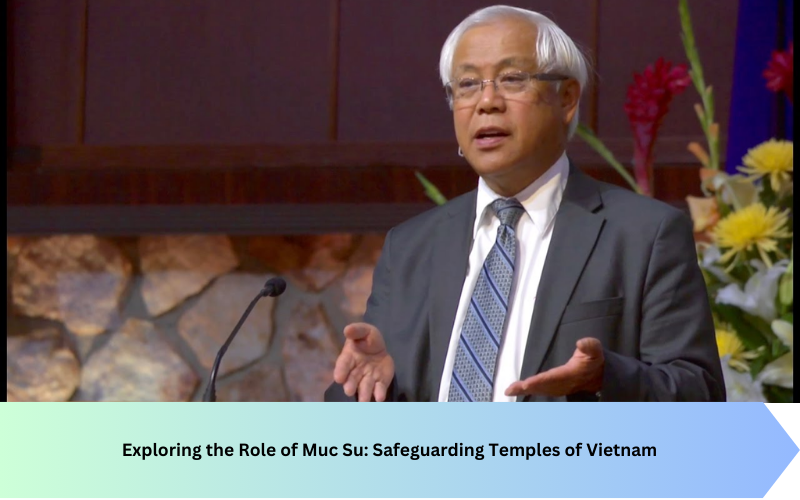Protectors of Temples in Vietnam
Vietnam as a nation has a very vibrant cultural and religious heritage and many of these aspects of culture are well protected and encouraged. Among these custodians of tradition, the “muc su” can be singled out as the people who are the temple custodians in Vietnam. Their work that dates back to many generations makes certain that the holy places of worship remain relevant and as they were meant to be. This blog is to explore more about the complex roles of muc su, its development and its continuing cultural relevance today
Muc Su
The term “muc su” can be best described as caretakers of Vietnamese temples as well as souls that are believed to dwell in temples. These temples which may embrace Buddhism, Taoism or ancestor worship are religious institutions of the society for performing sacred activities. The muc su are not just guardians but also the ones who maintain and protect religious practices for future generations.
Glimpses into the past of the Kingdom of Muc Su
The use of muc su can be traced back to the antiquity of the Vietnamese society as food. Traditionally, muc su were selected by the locals or religious institutions to manage the affairs of the temple. While their role functioned primarily as the maintenance of temples, they also oversaw religious rituals, teaching, and funding. Gradually, position of muc su was accepted as one of the essential elements of Vietnamese spirituality.
The following are the duties and responsibilities of Muc Su:
Temple Maintenance: Muc su are in charge of the maintenance of the temple facilities. This entails washing, painting, varnishing and overhauling structures, statues and altars. Their work enhances the cleanliness of the temple so that the worshippers are encouraged to come and worship in the temple.
Ritual Facilitation
They are central to the preparation and performance of rituals. This involves preparing incense, candles, flowers, icons and other religious symbols, and sometimes conducting prayers or hymns. They are able to lead the worshippers through various rituals due to their advanced knowledge of religious practices.
Educational Roles
Muc su more often than not becomes role models and guides of the young people as they explain religious scriptures, practices, or the importance of certain ceremonies. They may offer classes or unscheduled teaching sessions within the temple compound.
Community Leadership
In a society setting, the muc su play the role of arbitrators and provide counsel to the conflicting factions. This makes them reliable and sought-after arbitrators in their respective societies.
Preservation of Traditions: Through the documentation of rituals and oral history, muc su will benefit in the preservation of cultural relation to the temples. They may also participate in the training of new muc su, to make ensure that the knowledge is transferred to the next generation.
Some of the challenges faced by Muc Su include the following:
However, muc su face several difficulties due to their important duties. Due to modernization and influence of urbanization most of the traditional temples are on the decline and therefore it has been rare to find muc su who are active. Further, secularism among the younger generation has led to many opting out of the religious practices, meaning there are few volunteers for this highly demanding job. Lack of funds may also hamper the performance of duties fulfilled by muc su because most temples receive offerings from devotees.
The Shift of the Muc Su Role
As a result of these challenges, the role of muc su has changed. Some have also used modern technology in capturing and disseminating their performances especially in the area of rituals, history of temples among others. Social networks give a new opportunity to appeal to the young people, telling them about the traditions. A few muc su have also entered the larger sphere of cultural documentation and advocacy with historians and cultural institutions.
An Insight into the Cultural Relevance of Muc Su
Through examining the dynamics and roles of muc su, their importance reaches beyond their specific assignments. They are the bearers of tradition, the complex and unique mediators between the past and the present. This presence makes sure that these spaces continue to serve people in their spiritual activities, not becoming mere relics of such practices. In this way, muc su can help preserve the temples and sustain the corresponding cultural traditions that play an important role in the society of Vietnam.
Conclusion
Without the muc su, it would be impossible to preserve religious and cultural heritage of Vietnam. Their devotion to maintain temple practice, sharing knowledge among the people as well as conducting ceremonies guarantees the future sustenance of temples. Responding to the presented modern problems, the iterative feature and devotion of muc su will serve a significant purpose in keeping Vietnamese temple culture young. Only by providing our appreciation and assistance to their work, we can ensure that an essential component of Vietnam’s spirituality and heritage is sustained for generations to come.





